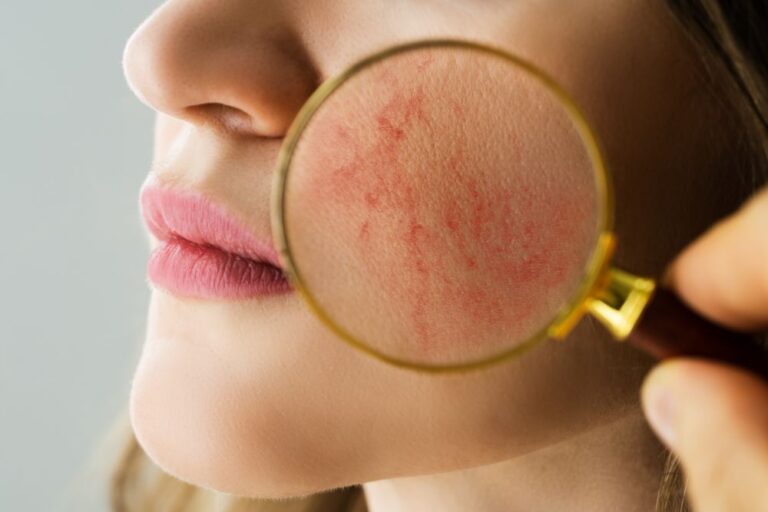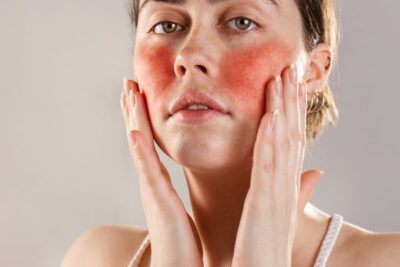January 20, 2024
Dealing with persistent facial redness and skin concerns can be challenging, and for many, rosacea adds an extra layer of frustration.
If you find yourself wondering why your skin is acting up, you’re not alone.
Whether it’s you or someone you care about going through this, understanding is key to facing the challenges of rosacea.
Let’s take a look at what causes rosacea and how to regain control over your skin’s well-being.
Together, we can navigate the path to clearer, healthier skin and a more confident you!
What is The Root Cause of Rosacea?
The exact reason for rosacea is unknown, but it seems to result from genetics, the environment, and how blood vessels work.
Figuring out these factors can help in finding better ways to treat it.
Here are some of the potential causes of rosacea:
Genetics and Rosacea
Research suggests that genetics play a role in the development of rosacea. If someone in your family has it, you might be more likely to have it too.
Specific genes may influence how your skin responds to triggers, making some individuals more prone to developing rosacea.
Understanding this genetic connection can help you unravel the mystery of your rosacea.
Environmental Factors
The environment around us can trigger or worsen rosacea symptoms. Exposure to sunlight, extreme temperatures, and certain weather conditions can impact the skin.
Exploring how these environmental factors contribute to rosacea can guide us in managing and preventing flare-ups.
For example, ultraviolet (UV) rays from the sun can cause skin inflammation, making it important for individuals with rosacea to practice diligent sun protection.
Blood Vessel Dysfunction
Rosacea often involves issues with blood vessels in the face, leading to redness and visible veins.
When blood vessels dilate too easily, it can increase blood flow to the skin’s surface, contributing to the persistent redness of rosacea.
Understanding how this dysfunction occurs can shed light on treatment options and effective management strategies.
Inflammatory Response
In addition to blood vessel dysfunction, an inflammatory response in the skin may also play a role in rosacea.
The immune system’s reaction to certain triggers can cause redness, swelling, and the formation of pimple-like bumps.
Knowing if inflammation is causing rosacea helps in developing targeted approaches to reduce symptoms and promote skin health.
What Are the Symptoms of Rosacea?
Understanding the signs of rosacea is important for addressing it quickly. If you’re not sure what to look out for, here are some common rosacea symptoms:
- Constant Redness on the Face: Persistent redness is a common indicator of rosacea, affecting various areas of the face.
- Visible Blood Vessels: The appearance of visible blood vessels on the face, often resembling tiny spider veins, is another common symptom.
- Small Bumps with Pus: Rosacea can lead to the development of small, pus-filled bumps, particularly in the central facial region.
- Irritated Eyes (Ocular Rosacea): Some individuals may experience irritation in the eyes, known as ocular rosacea. This adds another dimension to the symptoms and requires attention.
If you notice any of these symptoms, consulting with a healthcare professional can make a huge difference when it comes to your skin’s well-being.
What is the Number One Trigger?
Different things can make rosacea worse, and these triggers vary from person to person.
According to a Rosacea Trigger Study by the National Rosacea Society, sun exposure tops the list as the number one trigger at 81%.
Sun exposure can trigger rosacea by causing the blood vessels in the face to dilate. This can lead to increased redness and flushing.
The sun’s UV rays can also aggravate skin inflammation, contributing to the development of rosacea symptoms.
But the sun isn’t the only thing that can trigger rosacea. Other common triggers include:
- emotional stress
- hot weather
- wind
- heavy exercise
- alcohol consumption
- hot baths
- cold weather
- spicy foods
- humidity
- indoor heat
- certain skincare products
- heated beverages
- certain cosmetics
- medications, and medical conditions
Knowing and avoiding these triggers can significantly help lessen symptoms and improve your skin’s well-being.
Is There a Cure for Rosacea?
Currently, there is no complete cure for rosacea. It’s a persistent condition that requires ongoing management.
However, the good news is that various treatments and lifestyle adjustments can effectively control and alleviate its symptoms.
By working closely with dermatologists, individuals with rosacea can develop personalized strategies to minimize flare-ups and maintain healthier skin.
While a complete cure may not be available, proactive and consistent care can significantly improve the quality of life for those dealing with rosacea.
Rosacea Treatment Options
Handling this condition involves a mix of medical help, lifestyle changes, and specific treatments.
When determining the best course of treatment for rosacea, a dermatologist can tailor solutions to your individual needs.
Here are some treatment options:
Topical and Oral Medications
Doctors often prescribe creams or antibiotics to reduce inflammation and control bacteria linked to rosacea.
These medications are crucial for managing symptoms and preventing flare-ups.
Light or Laser Therapy
Light or laser therapy can be effective for those with persistent redness and visible blood vessels. These treatments focus on blood vessels, making them less visible and easing redness.
You might need a few sessions for the best results.
If you’re considering this option, our team at VITA Dermatology can guide you through the process and determine the most suitable plan for your skin.
Lifestyle Changes
Simple changes in your daily life can lessen the impact of rosacea. Always protect your skin from the sun, avoid things that make rosacea worse, and use gentle skincare products.
Identifying and managing stress is also important since stress can make rosacea worse.
Navigating Rosacea with Confidence and Care
Dealing with rosacea can be tough, but understanding what causes it is a step towards effective management.
If you’re facing rosacea, getting advice from pros is important.
With a mix of medical help, lifestyle changes, and ongoing care, you can make your skin and overall health better.
For personalized rosacea treatment in Edmonton, connect with the caring team at VIDA Dermatology.
We’re here to give you supportive care tailored to your needs.
Take the first step towards healthier skin – reach out to us today to get started!




